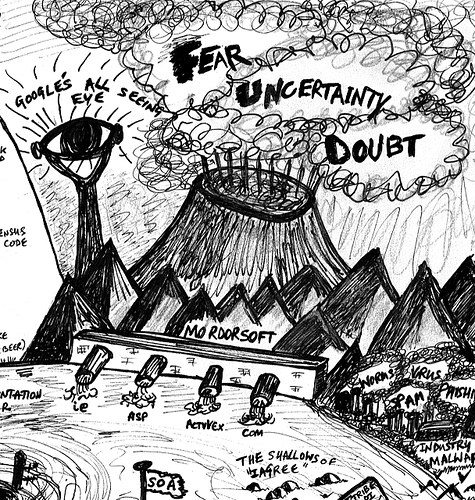There’s an old saying my granddad was fond of. “Dave,” he’d say, rocking his chair, puffing his pipe, squinting into the distance, “don’t be such an a**hole.”
Wise words. On reflection, my post about Tom Friedman’s column ended up unnecessarily heated and confrontational, even insulting. I stand by my take on the column, but Friedman is a sharp guy who’s done yeoman’s work legitimizing green issues (his book was great). He’s pursuing goals we share. If he’s doing so in a way that I find politically counterproductive in this case, he deserves to be addressed in a spirit of fraternity, not … blogginess. (Not for the first time I rue the fact that 95 percent of my published work consists of hastily written first drafts.)
It’s worth the time to explain, to Friedman and the wider world, why I and many others are so frustrated right now. Interestingly, reaction to my post was sharply split. From insiders — Congressional aides, legislative liaisons, folks inside the process — the reaction was “right on!” From readers and semi-engaged outside observers, the reaction was a bemused, “why so angry? He seems sensible to me.” (One exception: Kevin Drum, who gets it.)
What explains this dissonance? Why are people immersed in this stuff so frustrated, to the point that a simple op-ed column makes them want to chew their own faces off? Why so angry?
The moment
To understand the anger it helps to imagine, for a moment, that you are Rep. Ed Markey.
During the Clinton administration your green ambitions were thwarted by a Republican Congress. Then came six long years of ignorance and inaction under unified Republican rule, even as the science of climate change grew ever more dire and urgent. Finally, in 2006, your party regained Congress. Energy and climate were top priorities of your new Speaker, and she put you in charge of a special committee designed to publicize expert testimony, shift public opinion, shift business and elite opinion, and educate other members. All the learning, research, and planning greens had done underground for over a decade surfaced, and an honest-to-god process of moving toward legislation began. At last!
Then in 2008, history happened. A transformational candidate was elected president. Your majority increased in Congress. After a bruising battle, fellow green and top-notch legislator Henry Waxman was put in charge of the Energy & Commerce Committee, and you were placed atop the subcommittee on energy. Together, the two of you felt out the new landscape, talked with various lawmakers and members of the business community about what they’d need in exchange for their support, talked with minority groups and social justice groups and green groups and talked and talked and talked. A delicate dance, on a complex problem, with multiple competing interest groups, inched slowly forward.
Finally, after years of stifling inaction, you construct what you think is the strongest possible bill that can garner enough support to pass. Along with your Congressional leadership, you realize that this is the moment: a popular president in his first year, weakened opposition, and unprecedented public awareness.
It could all go away. If the economy worsens, Dems could get booted out in the mid-terms. Obama could lose in 2012. Energy and climate could fade from public consciousness as short-term suffering increases. Climate science makes clear that the time for efficacious action is growing perilously short. A looming international meeting in Copenhagen represents what may be the last real chance to shift the global trajectory.
This is the moment. You may not have a moment like it again any time soon. So you go big, piling all your energy/climate ambitions in to One Big Bill. It’s got historic changes in energy, energy efficiency, and the grid, not to mention the carbon cap and trade system that greens have been discussing for decades. You realize the cap-and-trade stuff is wonky and nobody outside DC understands or much cares about it, so you lead with the energy/jobs/economy stuff, which polls through the roof.
Finally. It’s here. The real fight begins! Time for everyone to call their armies and start marching! This is what everyone’s been waiting for! Right?
The Republicans
Nobody told Republicans that history happened. Despite all the talk about bipartisanship and cooperation from Obama, Congressional Republicans quickly made it clear that there would be no cooperation. No Republican votes for the White House agenda. Not even from Republicans in districts and states that Obama won by a hefty margin. It was going to be pure, uncut, implacable opposition. Even the hesitant steps some Republicans had taken toward sanity on climate (including John McCain) were erased, and House Republicans got back in the game of disputing the very existence of climate change. Republicans in both houses immediately attacked any effort to address climate as an economy-destroying tax.
The Democrats
Nobody told “moderate” Senate Democrats that history had happened. They immediately set themselves up as gatekeepers of Obama’s agenda, trimming billions (and millions of jobs) out of the stimulus bill. They voted to foreclose the option of passing the energy/climate bill as part of budget reconciliation (which requires only a 51-vote majority, not the 60 required to overcome a Republican filibuster). They criticized the decision to package energy and climate together, jealous of their jurisdictional prerogatives. They talked incessantly about the dangers of reducing carbon emissions to taxpayers in their states, and said nothing about tax rebates, energy efficiency, or the danger of climate change.
Obama’s team
Obama’s great messaging on green stuff during the campaign went out the window as his administration turned its focus to the banking crisis. Energy Secretary Steven Chu was out telling reporters that fundamental technological breakthroughs would be required before climate could be solved, and that the administration was leery to push a carbon cap during a recession (which implicitly concedes that it’s a blow to the economy, not the economic renewal Obama discussed on the trail). At the first hint of pushback from big business, Obama and science adviser John Holdren backed off on the administration’s pledge to auction 100 percent of the pollution permits under a cap, a clear social and economic justice concession. Holdren talked about how the administration was taking the hail-mary pass of geoengineering seriously. Obama and his team tripped over themselves to talk about how hard climate policy is and how willing to compromise they are.
The public
Obama and the Dems ran on a crystal clear platform of three priorities: energy, health care, and Iraq. Energy was, as Obama repeated several times, the first priority. Green is all the hype everywhere. So you might think that the public would be engaged in this push.
But polls find public interest as low as ever, and opinion about climate and energy policy as inchoate and incoherent as ever. There are no rallies. There are no emails and letters and phone calls streaming into Congressional offices. There is no real social movement behind energy/climate action. There’s nothing to push a recalcitrant member of Congress in the right direction.
The media and opinion leaders
This brings us, finally, to the group of people that has some ability to rally public action, to pressure Congress, to reinforce positive messages, and to educate a body politic that remains abysmally ignorant about both the problem and the range of possible solutions.
But even here, there’s no support. Congressional Dems put forward a bill that is fronted by historic, job-creating, national security-enhancing action on energy, efficiency, and the national grid. What does the media do? Even the progressive media? Cover it as a “cap-and-trade bill.” If you hadn’t read the bill itself, you’d have trouble telling from the media coverage that there were other provisions in it.
Do green journalists and bloggers and activists focus on the economy-reviving aspects of the bill? No. Almost more than the mainstream media, they obsess over the wonkiest, least popular aspect: carbon pricing. Even there, it is to bash cap-and-trade — a consensus policy position a decade in the making — in favor of a carbon tax. A huge new tax! This new progressive love of the tax code is bolstered by a bizarre mythology wherein a tax is simpler, and more popular, and more authentic, and downright heroic. Progressives bash Congressional Dems as greedy sell-outs and cap-and-trade as some kind of Wall Street-driven monstrosity. They focus attention on other bills that have zero chance of passing. They advocate scrapping a carefully wrought compromise built over four years by some of Congress’s savviest operators and replacing it with high taxes, on the premise that such a radical, disruptive strategy is better politics. Because everyone in America thinks like affluent, white, hyper-educated internet wonks, right?
In other words, when a serious climate bill is finally in play, its worst enemy turns out to be the left.
After decades of inaction, something is finally underway and nobody is fighting for it. Republicans are undermining it. Democrats are undermining it. Greens are undermining it. The public doesn’t give a damn. Imagine you are Markey. Imagine how you’re feeling.
Friedman
This, then, is the backdrop from which Friedman’s column emerged. The only sensibly green opinion leader with the reach and influence to clear up some of these confusions, focus some of this diffuse energy, pull the message back to stronger ground … does the exact, diametrical opposite: reinforces the worst messages, ignores the non-carbon parts of the bill, disses the people pushing the bill, and advocates for some other bill that has no chance of passing. It’s all the worst tendencies and messages, distilled to their essence, at the worst possible moment.
I wish Friedman had reached out to me, or Joe Romm, or someone on Markey’s staff. Any of us would be willing, nay, desperate to help.
Regardless, my tone was unnecessarily pissy. When the battle to pass energy/climate is joined in earnest, later this year, Friedman will fight on the side of the angels. And it’s a good thing. They’ll need all the help they can get.




